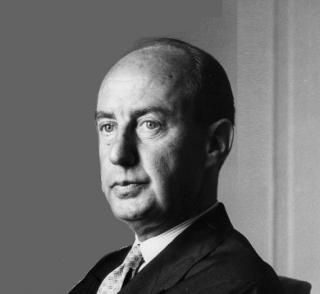On Adlai Stevenson
By Victor Urbanowicz

One doesn’t research Adlai E. Stevenson (1900-1965) very far before an impressive picture begins to form. His 1952 acceptance speech for the presidential nomination, for instance, would seem odd today because of the speaker’s ambivalence, but it plainly comes from an extraordinary mind:
I would not seek your nomination for the Presidency, because the burdens of that office stagger the imagination. Its potential for good or evil, now and in the years of our lives, smothers exultation and converts vanity to prayer.
In 1956 Stevenson failed to unseat the popular Dwight Eisenhower, and in 1960 he lost his party’s nomination to John F. Kennedy. There is far more to Stevenson, though, than these electoral losses. His speeches were often compared to Winston Churchill’s. His long record of public service includes working for the Secretary of the Navy in the Roosevelt administration and later helping to draw up the documents that created the United Nations.
“Congratulations on your election as president. I know from hearsay how satisfying that can be.” Stevenson to Dana McLean Greeley in 1961 on the latter’s election to presidency of the UUA.
President Truman appointed him delegate to the UN General Assembly in 1946 and 1947. In one term as governor of Illinois — an office which he held when offered the nomination and which he was reluctant to leave — he was effective at eliminating government corruption. Under the Kennedy administration he returned to the UN as US Ambassador. There he “served as president of the Security Council and advocated arms control and improved relations with the new nations of Africa” (Harvard Square Library). During the controversy over the Bay of Pigs invasion, Stevenson unwittingly issued false denials of CIA involvement because the administration had concealed the truth from him. On learning the truth, he came close to resigning his ambassadorship. In 1965, however, he died in London while holding that office.
Richard Henry readably describes Stevenson’s Unitarian connections in the Dictionary of Unitarian Universalist Biography:
Stevenson’s great grandfather, Jesse Fell, was the principal founder of the Unitarian church in Bloomington, Illinois in 1859. He also recruited the first minister, Gordon Ames. At the 80th anniversary celebration of the church, Stevenson, the featured speaker, recalled that his Presbyterian father sometimes urged him to go to Second Presbyterian Church on Sunday, but that always “we went to the Unitarian Church!” Though his father was related to many Presbyterian ministers, Stevenson claimed that his “earliest recollections are uniformly Unitarian.” He signed the membership book of the Bloomington (IL) Unitarian Church in 1952. “My mother was a Republican and a Unitarian, my father was a Democrat and a Presbyterian, Stevenson once explained. “I wound up in his party and her church, which seemed an expedient solution to the problem.”
Stevenson joined the Presbyterian church when he settled in Lake Forest (IL) because there was no Unitarian church close to home. This caused a kerfuffle among leading Unitarians until it was learned that he had been allowed to join without subscribing to the Westminster Confession. It was not his Presbyterian but his Unitarian background that he credited for his ability to compromise, his appreciation of points of view unlike his own, and his dislike of sectarianism and dogmatism. He was committed to social justice, though James Luther Adams was critical of his gradualism regarding racial integration.
“In America, anybody can become president. That’s one of the risks we take.” Adlai Stevenson
To learn more about Stevenson’s political career, eloquence, and wit, see two online resources: The Dictionary of Unitarian Universalist Biography and the Harvard Square Library. This piece has drawn substantially from these sources. And read his entire 1952 acceptance speech.
Adlai Stevenson’s unexpected death in London in 1965 was a shock to his many admirers, among them President Lyndon B. Johnson, some of whose remarks follow.
His great hero, Abraham Lincoln, said at the beginning of his political career, “I have no other ambition so great as that of being truly esteemed of my fellow men, by rendering myself worthy of their esteem.”
And although his disappointments were many, in this, like Lincoln, he was vindicated.
***
It seems such a short time ago that out of Illinois came that thoughtful eloquence summoning an entire nation back from its dangerous drift toward contentment and complacency. For an entire generation of Americans he imparted a nobility to public life and the grandeur to American purpose which has already reshaped the life of the nation and which will endure for many generations.
Sources
- Henry, Richard. “Adlai Stevenson.” Dictionary of Unitarian and Universalist Biography, an on-line resource of the Unitarian Universalist History & Heritage Society.
- “Stevenson, Adlai E. (1900-1965).” Harvard Square Library, A Digital Library of Unitarian Universalist Biographies, History, Books, and Media. Lyndon Johnson’s remarks on Stevenson’s death appear in their entirety here.
- “Unitarian Politicians and Other Oxymorons: Lessons from the Life and Times of Adlai Stevenson.”
- Image: Wikimedia Commons. Altered.
- Adlai Stevenson PDF (497 KB)